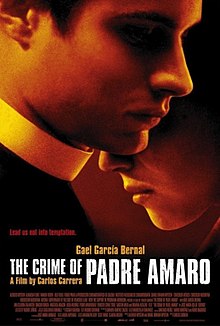
José Maria de Eça de Queiroz or Queirós is generally considered to have been the greatest Portuguese writer in the realist style. Zola considered him to be far greater than Flaubert. In the London Observer, Jonathan Keates ranked him alongside Dickens, Balzac and Tolstoy.

Gael García Bernal is a Mexican actor and filmmaker. He is known for his performances in the films Bad Education (2004), The Motorcycle Diaries (2004), Amores perros (2000), Y tu mamá también (2001), Babel (2006), Coco (2017), and Old (2021), for his role as the titular character in the Marvel Cinematic Universe television special Werewolf by Night (2022), and for his role as Rodrigo de Souza in the series Mozart in the Jungle (2014–18).

Bad Education is a 2004 Spanish drama film written and directed by Pedro Almodóvar. Starring Gael García Bernal, Fele Martínez, Daniel Giménez Cacho, Lluís Homar and Francisco Boira, the film focuses on two reunited childhood friends and lovers caught up in a stylized murder mystery. The metafictional film uses a deeply-nested narrative plot structure to explore themes of transsexuality, drug use, rape, and sexual abuse by Catholic priests. The film received an NC-17 rating in the United States for its depiction of homosexual sex.
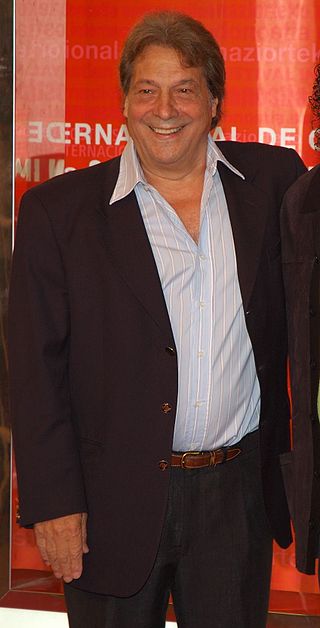
Félix Ángel Sancho Gracia was a Spanish motion picture and television actor.
Vicente Leñero Otero was a Mexican novelist, journalist, and playwright. He wrote numerous books, stories, and plays, including a theatrical adaptation of Oscar Lewis's The Children of Sanchez. He was awarded the Premio Xavier Villaurrutia in 2001, and the following year he received the Premio Nacional de Ciencias y Artes de México for literature and linguistics.

El padrecito is a 1964 Mexican comedy film directed by Miguel M. Delgado, starring Cantinflas, Ángel Garasa and Rosa María Vázquez.
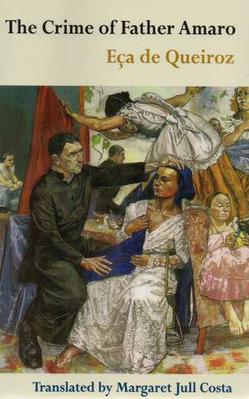
O Crime do Padre Amaro: cenas da vida devota, is a novel by the 19th-century Portuguese writer José Maria de Eça de Queiroz. It was first published in 1875 to great controversy.

Ana Claudia Talancón, is a Mexican actress, TV host, and philanthropist. She first started acting in her home town, Cancún, Quintana Roo.
Andrés Montiel, is a Mexican actor born in Guadalajara, Jalisco.

Nuevo Cine Mexicano, also referred to as New Mexican Cinema is a Mexican film movement started in the early 1990s. Filmmakers, critics, and scholars consider Nuevo Cine Mexicano a "rebirth" of Mexican cinema because of the production of higher-quality films. This rebirth led to high international praise as well as box-office success, unseen since the golden age of Mexican cinema of the 1930s to 1960s. The quality of Mexican films suffered in the decades following the golden age due in part to Mexican audiences watching more overseas films, especially Hollywood productions. This resulted in the rise of infamous Mexican genres such as Luchador films, sexicomedias and ultimately the low-budget direct-to-video Mexploitation film.
Alfredo Ripstein was a Mexican film producer of European-Jewish descent. He is credited with helping shape Mexico's film industry in the period surrounding World War II.
The MTV Movie Awards Mexico was an awards show which were established in 2003. The show is based on the US MTV Movie Awards format celebrating local film and actors.
The MTV Movie Awards Mexico 2003 was hosted by José María Yazpik and Patricia Llaca.
Soy tu fan is a Mexican romantic comedy television series produced by Canana Films, Fox Television Studios and Once TV México, and is an adaptation of the Argentina series of the same name created by Dolores Fonzi and Constanza Novick. It is directed by Álvaro Hernández, Mariana Chenillo & Gerardo Naranjo, produced by Pablo Cruz, Constanza Novick, Gael García Bernal, Diego Luna, Geminiano Pineda, Jorge Mondragón, Diego Martínez Ulanosky and Ana Claudia Talancón and written by Constanza Novick. It premiered Wednesday, April 28, 2010 in Mexico on Once TV Mexico, and in the United States on mun2, October 17, 2010. Season 2 began airing on October 19, 2011 on Once TV in Mexico.
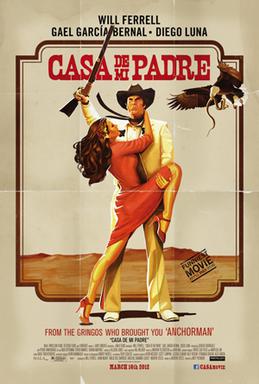
Casa de mi padre is a 2012 Spanish-language American Western comedy film directed by Matt Piedmont, written by Harper Steele, and starring Will Ferrell, Gael García Bernal, Diego Luna and Génesis Rodríguez. It was described to be in the style of an "overly dramatic 1970s telenovela" and tells the story of Armando Álvarez, who must save his father's ranch from a powerful drug lord. Casa de mi padre was released on March 16, 2012.
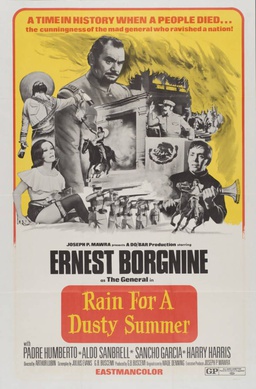
Rain for a Dusty Summer, originally known as Miguel Pro and released on DVD as Guns of the Revolution, is a 1971 Mexican revolution film. Shot on location in Spain, it depicts the life and death of Mexican priest Miguel Pro during the Cristero War. The lead role was played by Humberto Almazán, an actor who left the industry to become a priest and returned to acting for this film. The movie was the final feature film of director Arthur Lubin.

O Crime do Padre Amaro is a 2005 Portuguese drama film directed by Carlos Coelho da Silva and based on the 19th century novel of the same name by Eça de Queirós. It stars Soraia Chaves, Jorge Corrula and Nicolau Breyner.

Roberto Sneider is a Mexican writer, director and producer best known for his films Dos Crímenes and Tear This Heart Out.
Fernando Becerril was a Mexican actor. He was cast in numerous Spanish-language films since 1998 like El crimen del padre Amaro (2002), Tlatelolco,verano del 68 and The Legend of Zorro (2005).
Gabriel Ripstein is a Mexican film producer, director, editor and screenwriter. A producer since 1999, Ripstein has been involved in nine feature films. Two of his productions competed for the Palme d'Or at the Cannes Film Festival: El Coronel No Tiene Quien le Escriba and Chronic. Ripstein also wrote screenplays for Amor a Primera Visa, Compadres, and Busco novio para mi mujer.
